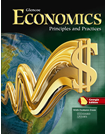1 A) international advantage B) relative advantage C) comparative advantage D) absolute advantage 2 A) bananas B) coffee beans C) banking D) raw materials 3 A) better climate B) larger labor force C) comparative advantage D) absolute advantage 4 A) North American Free Trade Agreement (NAFTA) B) World Trade Organization (WTO) C) most favored nation clause D) balance of payments 5 A) infant industries argument B) balance of payments C) most favored nation clause D) North American Free Trade Agreement (NAFTA) 6 A) North American Free Trade Agreement (NAFTA) B) World Trade Organization (WTO) C) free traders D) most favored nation clause 7 A) most favored nation clauses B) rigorous health inspections C) requiring import licenses D) prohibiting genetically altered crops 8 A) one currency is fixed in terms of another B) the exchange rate does not change C) supply and demand determine currency's value D) gold was once the common denominator 9 A) rise, making imports cost more B) decline, making imports cost more C) decline, making exports cost more D) rise, making exports cost less 10 A) trade deficit – spending on imports is less than revenue from exports B) trade surplus – revenue from exports is less than spending on imports C) flexible exchange rates – rates established by supply and demand D) floating exchange rates – rates remain fixed in relation to one another







